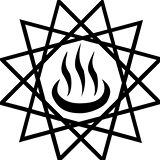by Melissa
(11-13 Pyanepsion) The Thesmophoria was a pan-Hellenic festival that, in Athens, lasted three days during the time of the fall planting and included an important women-only component. Although scholars debate what the thesmoi were that were borne, the women-led part of the festival involved the procession of all the women of Athens (except for maidens) up to the Thesmophorion, a site probably on the hillside of the Pnyx, and their encampment there, apart from all men, for three days. Among other features of the festival, the women shunned sexual relations, celebrated without wearing wreaths and avoided foods that appear to relate to Demeter, such as pomegranate seeds that had fallen on the ground, for these, apparently, were deemed to be an offering to the Chthonic Deity (Burkert 244). Of these, the Hymn tells us, Hades “secretly gave [Persephone] sweet pomegranate seed to eat, taking care for himself that she might not remain continually with grave, dark-robed Demeter” (Homeric Hymn 2, lines 372-374).
The women also fasted while sitting on the ground on branches. Foley says that they “imitated ‘the ancient way of life’ before the discovery of civilization, and mourned, probably in imitation of Demeter, for Persephone” (72). Demeter had left the realm of the immortals and found her way to the world of mortals, who are familiar with the sorrow of losing loved ones to Hades, and “sat down and held her veil in her hands before her face. A long time she sat upon the stool without speaking because of her sorrow, and greeted no one by word or by sign, but rested, never smiling, and tasting neither food nor drink, because she pined for her deep-bosomed daughter” (Homeric Hymn 2, lines 197-201).
The end of Demeter’s grieving on this occasion occurred when a servant of her host, “careful Iambe—who pleased her moods in aftertime also—moved the holy lady with many a quip and jest to smile and laugh and cheer her heart” (Homeric Hymn 2, lines 201-204). In a similar way, the women ended their mourning in the Thesmophoria with aischrologia, derisive language, in imitation of Iambe. The day of fasting and mourning was followed by a day of celebrating and praying for “fair offspring”, whether of children or crops, since Demeter presides over not only the cereal crops but also human fertility (Parke 87).
Perhaps the oddest feature of Thesmophoria involved a sacrifice of piglets, and not just any piglets but piglets that had previously been thrown into “chasms”. A scholar commenting on Lucian’s description of the holiday justifies the ritual of casting the piglets as follows: “When the Maiden was carried away by Pluto as she was gathering flowers, at that time in the same place a swineherd Eubouleus was grazing his pigs and they were swallowed up in the chasm with the Maiden. Therefore, in honor of Eubouleus, piglets are thrown into the chasms of Demeter and the Maiden” (Parke 159). Piglets, moreover, were associated with female genitalia, and the organs of both men and women were related to fertility of crops, as illustrations demonstrate (also at the Haloa). Parke conjectures that the corpses, along other items, had been thrown into the caverns earlier in the summer, at the Skiraphoria, and retrieved for this festival. Although placed on the altars at some point, eventually these remains were plowed into the fields to ensure fertility of the crop (Parke 83).
Helene P. Foley, in her background article on the Eleusinian Mysteries in her edition of The Homeric Hymn to Demeter, states that “all important rites of Demeter in Attica seem to have been linked (at least loosely) to stages of the agricultural year (71). Moreover, these festivals seem to have a connection with some part of the Homeric Hymn, especially since Eleusis, which was incorporated into Attica, was the site of much of the narrative of the Hymn. Thus the Thesmophoria is part of the sacred festival cycle of grain in ancient Greece, along with the Proerosia (also October), Haloa (December), the Lesser Mysteries (February), Thargelia (May), Skirophoria (June) and the Eleusinian Mysteries (September).
Sources:
Burkert, Walter, Greek Religion, (Blackwell Publishing, 1987)
Foley, Helene P., ed., introduction, Homeric Hymn to Demeter, Princeton, 1994
Parke, H.W., Festivals of the Athenians, 1977
White, Hugh G. Evelyn, translator, Homeric Hymns, Loeb, 1914, 2002
